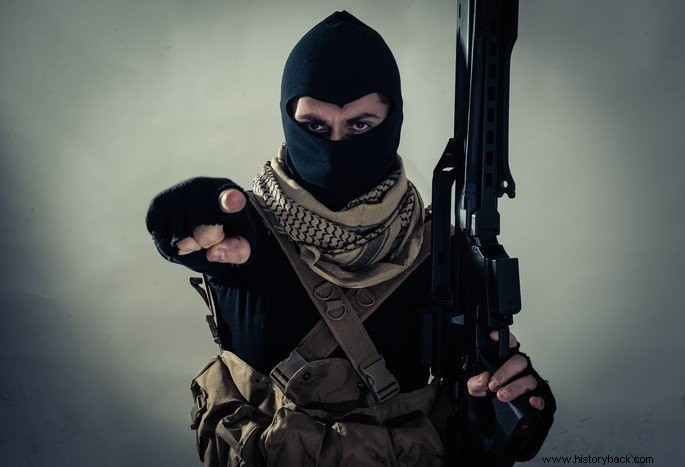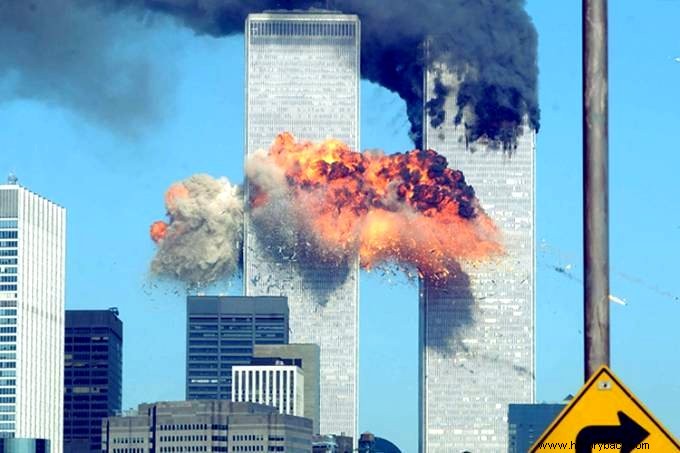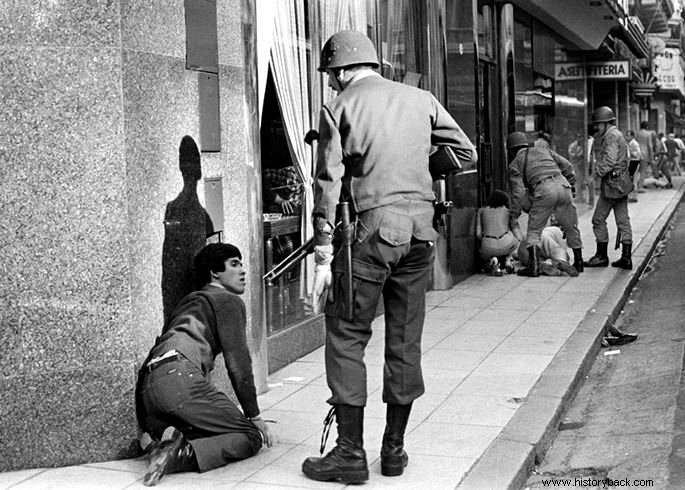Terrorism are violent acts committed by persons or groups in order to cause fear and material harm to a State or a population.
The term emerged during the French Revolution, in order to designate the most radical factions of the revolutionary process, between 1793-1794.
This definition would return after the Second World War, to name separatist or leftist groups that used violence to claim their rights of emancipation.
Terrorism in the World

The definition of a terrorist act depends on each country, as there is no consensus in international law on what terrorism is.
The Encyclopedia Britannica establishes it as:
Despite the lack of consensus, some elements seem to be common in 20th and 21st century terrorist acts.
The first is that it is carried out by people with a low tolerance for individuals who do not conform to a certain ideology.
Likewise, terrorism seeks to cause spectacular acts of violence that attract a lot of attention. Therefore, the chosen target must cause a large number of victims or be in a place that will yield hours of television programs and reports.
The United States follows the Bush Doctrine to define which acts receive the classification of terrorists.
See also:What is Ideology?Terrorist Attacks
The September 11, 2001 attack in New York City against the Twin Towers and the Pentagon was considered a milestone for the definition of terrorism as we understand it today.

In the same way, we can cite the attacks:
- March 11, 2004 (Madrid) :Almost simultaneous explosions occurred in some train stations in the Spanish capital. About 190 people died and 2000 were injured.
- September 1, 2004 (Russia) :This attack took place in the city of Beslan and became known as the "Beslan Massacre". About 1200 hostages were held inside a school for three days. About 330 people died, between adults and children.
- July 7, 2005 (London) :Explosions occurred in several parts of the city, in subway stations. About 50 people died and 700 were injured.
- March 29, 2010 (Moscow) :39 dead and almost 40 wounded was the result of the explosions that took place in Moscow, Russia, by Chechen terrorists.
- November 13, 2015 (Paris) :in various parts of the French capital, such as the Bataclan concert hall or near the Stade de France, there were explosions and shootings of civilians. 137 people died and more than 400 were injured.
- August 17, 2017 (Barcelona) :a van hit several pedestrians in the city of Barcelona. Likewise, in the cities of Alcanar and Cambrils there were explosions. This attack left 16 dead and more than a hundred injured.
- 21 April 2019 (Sri Lanka) :on Easter Sunday there were several explosions caused by suicide attacks on Christians in particular and tourists in general. It was one of the bloodiest attacks in history with 258 dead and around 500 wounded.
Current terrorist groups
The main terrorist groups in the world are:
1. Al Qaeda
Al-Qaeda emerged in the Middle East and is a group of Islamic fundamentalists who command part of the terrorist attacks around the world. Osama Bin Laden was one of the leaders.
See also:Al Qaeda2. Islamic State
The Islamic State appears with the intention of forming an independent Islamic nation and acts mainly in the Syrian War, in addition to being responsible for several terrorist attacks in the world.
See also:Islamic State3. Boko Haram
Boko Haram which means “un-Islamic education is a sin” is a terrorist group that operates mainly in Nigeria. Your objective is to create an Islamic republic in this country using means such as kidnappings and deadly attacks on enemies.
Former terrorist groups
There are groups that ceased their activities in the 21st century, but caused panic in humanity's recent past.
1. ETA (Basque Homeland and Liberty)
ETA is a Basque separatist group, which has its origins in the Spanish Basque Country. This terrorist group fought through violence for territorial independence from France and Spain.
See also:ETA:all about the Basque separatist group2. IRA (Irish Republican Army)
A Catholic paramilitary group that, since the 1960s, began to act for the departure of British forces from the territory of Ireland, that is, the separation of Ireland and the United Kingdom. It ended its activities in 2005.
Types of Terrorism
Despite being characterized by violent actions, it is possible to differentiate some types of terrorism.
Indiscriminate Terrorism
The name itself already indicates that there is no specific target. The main characteristic is to attack the life of the civilian population indiscriminately.
One of the means is to deposit bombs in garbage cans, cafes, cinemas, subways and other public places, in order to draw the government's attention and spread fear among the population.
This type of terrorism can be practiced both in peacetime and in war. During the Algerian War, the Algerians used to use this method against the French.
See also:War in AlgeriaSelective Terrorism
In this case, there is a specific target and their actions are mainly based on blackmail, torture, psychological terror, among others.
A notorious example of this type of terrorism is the American Protestant and racist group Ku Klux Klan (KKK), founded in 1865.
His targets were primarily the black population of the United States and, to a lesser extent, Jews and whites fighting for the civil rights of these minorities.
See also:Ku Klux KlanState Terrorism

Dictatorships, with the pretext of imposing order, practice human rights violations against political groups that do not fall under the laws of the State of exception.
In this way, they suspend constitutional guarantees and cover up the violence practiced by the police forces.
As an example, we have State terrorism at the time of Nazi Germany or the actions of the English State against demonstrations carried out by the Irish, such as Bloody Sunday.
See also:Bloody SundayCommunal Terrorism
Also called Community Terrorism, it is characterized by demonstrations and attacks aimed at controlling and weakening the productive capacity of the community.
Thus, targets such as cisterns, pastures, cattle, the right to come and go and everything that serves as an economic sustenance for a population are reached.
A clear example is the regions that are controlled by drug traffickers, who start to dictate the rules of coexistence for that population.
See also:drug traffickingTerrorism in Brazil
Due to international events such as the World Cup (2014) and the Olympics (2016), Brazil has become a potential target for terrorism.
The Federal Police has monitored certain Islamic groups and individuals who write messages extolling terrorist acts or groups.
In October 2018, there were data that three Brazilians had joined the Islamic State in Syria.
See also:Islamic State Keep informed with these texts :
- What is dictatorship?
- Civil War
- The Terror in the French Revolution
